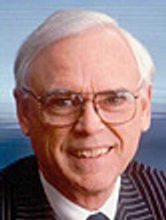 Roderick has made a considerable contribution to New Zealand over the past 30 years: as an economist and policymaker; as a corporate leader; and as a citizen supporting the arts and the disadvantaged.
Roderick has made a considerable contribution to New Zealand over the past 30 years: as an economist and policymaker; as a corporate leader; and as a citizen supporting the arts and the disadvantaged.
Following his early days at Opunake and New Plymouth Boys High, Roderick studied Accounting and Economics at Victoria University. Much of his study was undertaken part time while he worked, first at the Union Steamship Company, and then at the Reserve bank. He came away from Victoria in 1968 with one of their first PhDs, on Foreign Investment in New Zealand Manufacturing, which was subsequently published. The doctorate was supervised by another of our Distinguished Fellows, Sir Frank Holmes.
While Roderick’s doctorate had contained little in the way of econometrics, he made up for this when he returned full time to the Reserve Bank in 1967. He was the driving force in the early development of the Reserve Bank econometric model, which was aimed at providing a consistent framework for monetary policy. From the time of the first modelling discussion paper presented to this Association’s conference in 1968, a significant research capability was built up at the Reserve Bank. As a new graduate economist at the Bank in the mid 70s, I can attest to the stimulating and enjoyable research environment that Roderick promoted.
In the policy arena, Roderick had begun in the mid 70s to promote the rationalisation and liberalisation of the financial system. Much of this work was put on hold, and indeed into reverse, with Muldoon’s re-regulation of the economy from 1982. However, once the Lange/Douglas Labour government came to power in 84, the policy reform process was back on the table – and on steroids. Appointed as Deputy Governor in 1982, Roderick was well placed to be in the vanguard of the reforms, in particular leading the charge on the removal of interest rate regulations and exchange controls and the floating of the NZ dollar in March 1985. Roderick was very persuasive with Officials and cabinet ministers of the day and, importantly, his ideas and commitment to the free market were closely aligned to those of Roger Douglas.
In 1986, at the request of David Lange and Roger Douglas, Roderick took on the major task of restructuring the Public Service as Chairman of the State Services Commission. His ability to see the big picture, to apply common principles of good governance, and simply get things done, contributed to major reforms in the Public sector over this period. In particular, he contributed to the separation of commercial and public policy objectives and the clarification of accountabilities, as typified in the creation of nine new SOEs in 1987.
After a very active year at the State Services Commission, Roderick made his transition to the corporate sector; first as CEO of the Electricity Corporation and then as CEO of Telecom in 1992. This was a period of major transition for both organizations with the Electricity Corporation transforming from a Government Department to an SOE and Telecom taking the next move from SOE to public company. From an economics perspective, Roderick extended his expertise in macro and institutional economics to Law and Economics and indeed further into regulatory economics and network analysis. Increasingly, as he then moved into directorship roles in the late 1990s, Roderick would focus on the principles of good corporate governance and their interaction with regulatory frameworks.
But of course you don’t get to be a top corporate leader just by being a good economist. Roderick once told me years ago that you need three things to succeed in management: Brains; People skills; and third an ability to get things done. I think you will agree with me that Roderick meets all three criteria with ease. The brains go without saying; the people skills are apparent from the loyalty that Roderick instills in the people around him and from his open and honest communication style. And Roderick’s ability to get things done has been his hallmark throughout his career, from the financial reforms of the 1980s to the corporate restructurings of the 1990s.
Roderick continues to apply his considerable talents and now broad experience in a number of top boardroom roles. He chairs three of New Zealand’s top companies: Telecom, ANZ National and Fletcher Building. And sits on several other boards. Roderick also contributes a considerable amount of his time to the disadvantaged and to the Arts. He has had a long association with the IHC, including a period as President and ongoing role as patron. Roderick and his wife Gillian have also contributed to the Arts in New Zealand over many years, supporting a number of individual artists and a range of music and arts organizations. Roderick currently chairs Te Papa and the City Gallery Wellington Foundation.
For the New Zealand Association of Economists, it is Roderick’s contribution to economic policy and public sector reform in New Zealand that are most important and the basis for his recognition as a Distinguished Fellow of this Association. However, Roderick’s much broader contribution to New Zealand makes him a particularly deserving recipient of this award.
Grant Spencer
